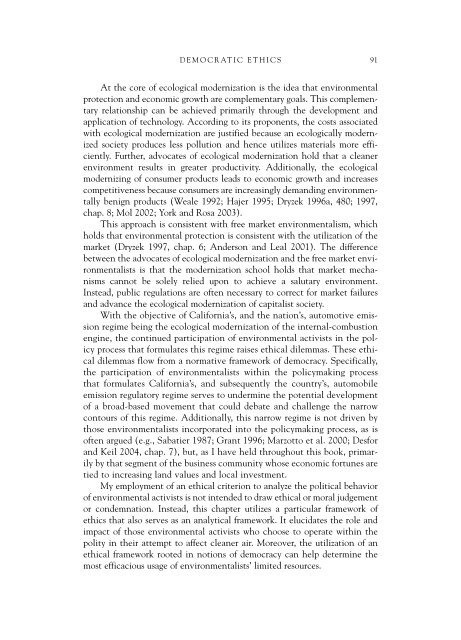GEORGE A. GONZALEZ - fieldi
GEORGE A. GONZALEZ - fieldi
GEORGE A. GONZALEZ - fieldi
You also want an ePaper? Increase the reach of your titles
YUMPU automatically turns print PDFs into web optimized ePapers that Google loves.
DEMOCRATIC ETHICS 91At the core of ecological modernization is the idea that environmentalprotection and economic growth are complementary goals. This complementaryrelationship can be achieved primarily through the development andapplication of technology. According to its proponents, the costs associatedwith ecological modernization are justified because an ecologically modernizedsociety produces less pollution and hence utilizes materials more efficiently.Further, advocates of ecological modernization hold that a cleanerenvironment results in greater productivity. Additionally, the ecologicalmodernizing of consumer products leads to economic growth and increasescompetitiveness because consumers are increasingly demanding environmentallybenign products (Weale 1992; Hajer 1995; Dryzek 1996a, 480; 1997,chap. 8; Mol 2002; York and Rosa 2003).This approach is consistent with free market environmentalism, whichholds that environmental protection is consistent with the utilization of themarket (Dryzek 1997, chap. 6; Anderson and Leal 2001). The differencebetween the advocates of ecological modernization and the free market environmentalistsis that the modernization school holds that market mechanismscannot be solely relied upon to achieve a salutary environment.Instead, public regulations are often necessary to correct for market failuresand advance the ecological modernization of capitalist society.With the objective of California’s, and the nation’s, automotive emissionregime being the ecological modernization of the internal-combustionengine, the continued participation of environmental activists in the policyprocess that formulates this regime raises ethical dilemmas. These ethicaldilemmas flow from a normative framework of democracy. Specifically,the participation of environmentalists within the policymaking processthat formulates California’s, and subsequently the country’s, automobileemission regulatory regime serves to undermine the potential developmentof a broad-based movement that could debate and challenge the narrowcontours of this regime. Additionally, this narrow regime is not driven bythose environmentalists incorporated into the policymaking process, as isoften argued (e.g., Sabatier 1987; Grant 1996; Marzotto et al. 2000; Desforand Keil 2004, chap. 7), but, as I have held throughout this book, primarilyby that segment of the business community whose economic fortunes aretied to increasing land values and local investment.My employment of an ethical criterion to analyze the political behaviorof environmental activists is not intended to draw ethical or moral judgementor condemnation. Instead, this chapter utilizes a particular framework ofethics that also serves as an analytical framework. It elucidates the role andimpact of those environmental activists who choose to operate within thepolity in their attempt to affect cleaner air. Moreover, the utilization of anethical framework rooted in notions of democracy can help determine themost efficacious usage of environmentalists’ limited resources.









